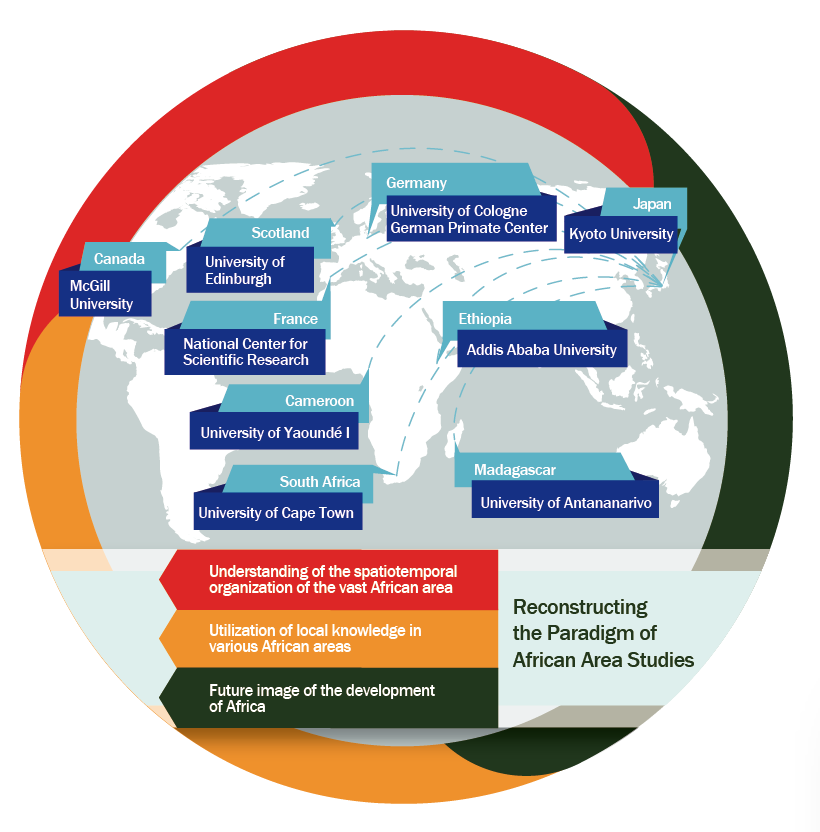Program Overview
 Program Overview
Program Overview
The CAAS and ASAFAS at Kyoto University have strived to nurture scholars in area studies who employ fieldwork as their primary method for education and research, and who are equipped with African “local knowledge” as well as cross disciplinary knowledge. In line with this background, this project has the following aims: further promote mutual academic exchanges with affiliated institutions overseas, which have outstanding research environments for area studies and with which the CAAS and ASAFAS have had continuous academic exchanges, and recontextualize the research paradigm of African Area Studies in Japan for facilitating the understanding of the “African area” in the increasingly globalised contemporary world. In response to this purpose, outcomes of education and research accumulated so far by the affiliated institutions as well as their future initiatives will be summarized and analyzed from the following three perspectives in order to integrate these with the area studies that the ASAFAS has been promoting.
1. Understanding of the spatiotemporal organization of the vast African area
“Areas” are continuously changing, and the intellectual framework for understanding such changes also keep changing. It is one of the issues comprising the logical framework of area studies as to how we understand “areas” in terms of the way in which they have been organized spatiotemporally. With respect to the African continent and its surroundings, this project explores as to what solutions have been provided to the issues described above by various research institutes, which have the record of excellent achievements in their area studies. Furthermore, through the comparison and examination of the different ways of understanding “areas” between those research institutions and CAAS/ASAFAS, this project also aims to contribute to the formation of a new paradigm for area studies.
2. Utilization of local knowledge in various African areas
CAAS and the researchers at ASAFAS have been witnessing on the spot formation of local knowledge created by people living in Africa and elucidating its dynamics, as well as exploring the possibility that such local knowledge plays an active role in resolving various issues faced by Africa. From these perspectives, this project reveals as to how various research institutes with an outstanding record regarding area studies have conducted research on local knowledge in Africa and how they have intended to utilize their achievements. Moreover, through these comparative studies, the project aims to advance logical understanding of the relationship between local knowledge and other forms of knowledge.
3. Future image of the development of Africa
The discipline of Area Studies has actively proposed, based on its results, as to how we should design the areas studied going forward. In addition, Area Studies has produced a number of experts and administrative officials who will be responsible for practical works. In particular the research institutes, which are involved in this project as partners, are known for their achievements in that they have developed a variety of methods for merging academic studies with the policy sciences of respective areas. In this project, the two-way development of young researchers will be implemented with these research institutions and academic cooperation between organizations will further be promoted. Through these activities, the project aims to explore the ways in which multiple cultures live together overcoming contemporary issues faced by Africa and other various areas in the world.
For the successful implementation and accomplishment of these missions, the colaborative relationship with eight affiliated institutions (University of Cologne, German Primate Center, the University of Edinburgh, National Center for Scientific Research, Addis Ababa University, the University of Yaoundé I, University of Cape Town, University of Antananarivo) will be strengthened, and young scholars will be dispatched to these institutions to conduct joint research with the purpose of writing international joint authored papers.








